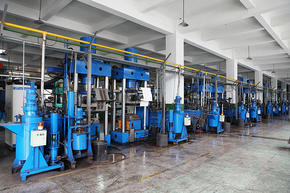Industrial magnetic material plays a crucial role in a wide range of manufacturing and technological processes. These materials are specifically designed to exhibit magnetic properties suitable for industrial use, such as in motors, sensors, transformers, and various other equipment. The term industrial magnetic material covers a variety of substances, including ferrites, rare-earth magnets, and soft and hard magnetic alloys.
One common characteristic of industrial magnetic material is its ability to maintain magnetic strength under demanding operational conditions. For instance, these materials are often required to perform consistently despite exposure to high temperatures, mechanical stress, or corrosive environments. Therefore, selecting the right industrial magnetic material depends on the specific requirements of the application.
Soft magnetic materials are typically used in applications where rapid magnetization and demagnetization are needed. Examples include transformers and inductors, where the material must efficiently conduct magnetic flux with minimal energy loss. On the other hand, hard magnetic materials, often known as permanent magnets, provide constant magnetic fields and are commonly used in motors, generators, and magnetic separators.
Industrial magnetic material manufacturers develop various grades and compositions to address different needs. For example, ferrite magnets are widely used due to their resistance to corrosion and affordability. Meanwhile, neodymium magnets offer strong magnetic fields in a compact size, making them useful for applications where space is limited.
Another important aspect when considering industrial magnetic material is its machinability and form factor. Depending on the manufacturing process, these materials can be produced as sheets, rods, powders, or custom shapes. This flexibility allows industries to integrate magnetic components seamlessly into their products.
Sustainability and environmental impact are also factors gaining attention in the field of industrial magnetic material. Some materials contain rare-earth elements, which require careful sourcing and recycling to reduce environmental strain. Manufacturers are increasingly exploring alternatives and improved production methods that balance performance with ecological considerations.
In addition to production, quality control is vital in the supply of industrial magnetic material. Testing for magnetic strength, coercivity, temperature tolerance, and mechanical properties ensures that the materials meet the standards needed for reliable performance. Consistency in these properties helps industries maintain product quality and operational safety.
The industrial magnetic material sector supports many industries, including automotive, electronics, renewable energy, and manufacturing. In electric vehicles, for example, magnets are essential in electric motors and battery systems. Similarly, in renewable energy, industrial magnetic material is used in wind turbine generators and other equipment.
Industrial magnetic material is a versatile and essential component in modern technology and industry. Its wide range of forms and properties enables its use across diverse applications, while ongoing developments focus on improving sustainability and performance. When choosing industrial magnetic material, understanding the specific application needs and material characteristics is key to ensuring effective integration.

